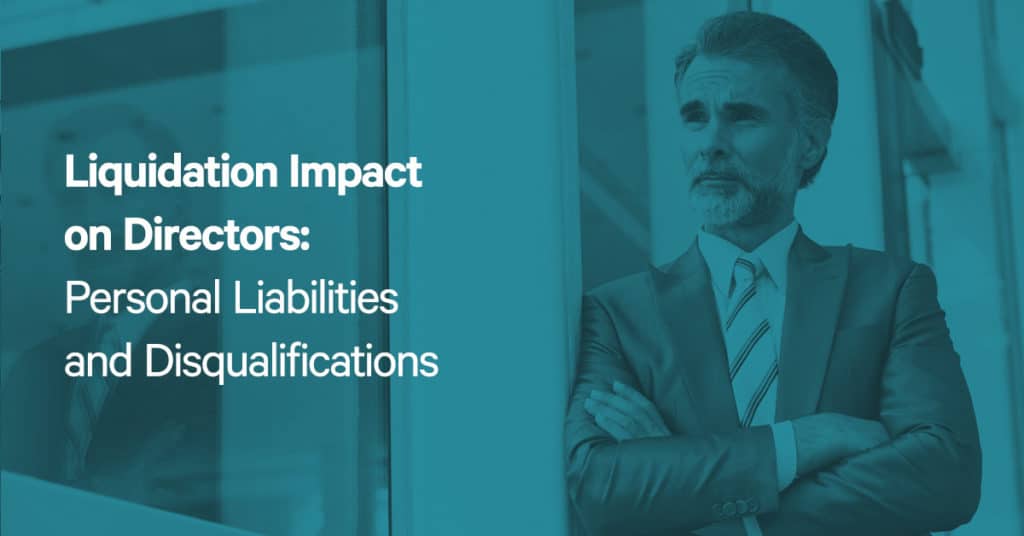If a business falls on hard times and needs to go into liquidation, directors are usually curious about whether or not they are going to be liable for any of the company’s ongoing debts, and also what their general liabilities are towards the company. This is a fair question and will discuss Liquidation’s Impact on Directors throughout the below article.
Protection from Debt
As a general rule, directors of limited companies are usually protected from any kind of personal liability for the debts of the company. The clue is in the name of a limited liability company, which essentially means the company is its own legal entity, so its debts are its own and not that of the director.
One of the main reasons that people start a limited company, even if they are a sole trader or in a partnership for the time being is because they can limit their exposure to business debt by doing so. They are incorporated as distinct legal entities and as such, the court views this as an entity which is separate from the directors who are in charge of the business. More often than not, this is known as the corporate veil.
That being said, it is worth noting that there are some exceptions which would make it so that directors become personally liable for a company’s debts. This usually occurs in situations where creditors need protection from negligent and dishonest conduct by the directors of a company which finds itself in difficult economic times.
If a director is going to be personally responsible for the debt of a business then this is linked in whole to their actions and behaviour. If the company is insolvent then directors need to act in a way which protects creditors and limits loss as much as possible, if they don’t do this then they could become responsible for the creditor’s losses.
What Are Director’s Liabilities for Company Debts?
The way that a company is structured limits the personal liability of company debts on a director. That being said, if the company finds itself in financial difficulty or has for whatever reason become insolvent, then the directors will be held liable for the debts of the company if it is found that they didn’t take any action or completely neglected to protect the creditors money as much as possible.
Insolvency practitioners and liquidators need to look into how a business has acted when it enters into liquidation to make sure that the directors haven’t acted in a way which will make them personally responsible for the debt. The reason for this is because the public should be protected from negligent directors of companies and personal liability can come with sanctions on them acting on behalf of a business again.
There are a number of different examples of transactions that can result in financial consequences for directors, these include some of the following:
- Directors Loan Accounts: This is where a director will overpay themselves using company accounts. If a director’s account has been overdrawn then they will be subject to pay it back.
- Undervalued Transactions: An undervalued transaction is where directors sell assets well below market value in order to make a quick sale, therefore lowering the amount of money which will go to creditors. It may be the case that if a liquidator believes assets have been sold below market value then the transaction is reversed or the difference is covered.
- Preferential Payments: Here, one specific creditor is preferred over the others. All creditors should be paid the same amount in equal turns but if one is preferred over the other then the liquidator may request the money is returned and distributed evenly.
- Fraud and Misrepresentation: A director who lies or misrepresents any kind of material fact when they are applying for credit or a loan on behalf of the business can be held liable for the debt.
What Are the Consequences for a Director if They Are Liable for Company Debts?
One of the primary consequences for any director who has been held personally liable for the debts of a company is a loss of their assets and personal bankruptcy if they are not able to repay the money that they owe. There can also be court action taken by the liquidator and the damages sought will be realised from the personal assets of the director. They are also going to be liable for the legal costs of the liquidator, which can be pretty significant.
It may be the case that directors can be formally disqualified, which means that they are unable to be the director of a business for up to 15 years. This kind of order can also stop the director of a business from taking on other roles, such as helping to manage a business, acting as a consultant and or being a charitable trustee for a school or other organisation.
Finally, if there is clear and overriding evidence that suggests unethical fraudulent activity then this is likely to lead to a criminal prosecution too, which could see the director spending time in prison.
Do You Need Help with The Liquidation of Your Business?
If you own a business and you find yourself in hard times, then it may well be the case that your company needs to file for liquidation. There are a number of circumstances that can lead to a business becoming insolvent and if these have impacted you, it is important that you get experts on board who will be willing to sit down with you to talk about your business, how it works, the position you find yourself in and then provide advice on how to move forward. At Simple Liquidation, we are on hand to provide that advice for you in the most stress-free way possible. If you have any questions or require any further information on the liquidation process and personal liabilities then do not hesitate to get in touch.




